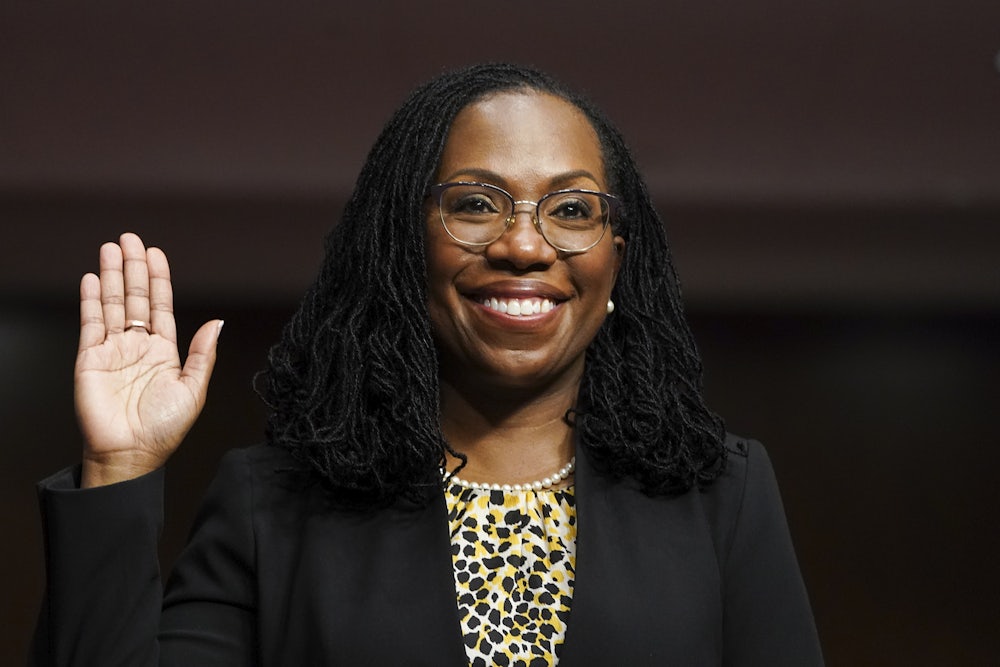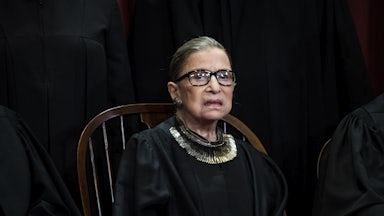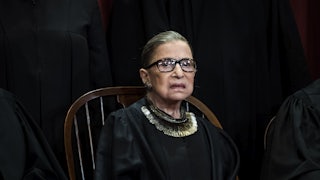Two years ago, then-candidate Joe Biden made a promise to voters on the campaign trail as he battled to survive in the Democratic presidential primaries: He would, if elected, nominate the first Black woman to the Supreme Court. On Friday, Biden took a major step toward fulfilling his campaign pledge by announcing that Judge Ketanji Brown Jackson will be that nominee.
Jackson, a 51-year-old judge on the D.C. Circuit Court of Appeals, will not radically alter the high court’s ideological balance. But she is poised to bring a new perspective to its proceedings—and will help ensure that the court does not tilt even further to the right by replacing the 83-year-old retiring Justice Stephen Breyer. Her nomination is also a victory of sorts for liberal legal activists who preferred her over two other judges on Biden’s shortlist.
With a razor-thin 50-vote majority in the Senate, Democrats are eager to get Jackson through the grueling confirmation process as quickly as possible. “We will begin immediately to move forward on her nomination with the careful, fair, and professional approach she and America are entitled to,” Illinois Senator Dick Durbin, the chairman of the Senate Judiciary Committee, said after Biden’s announcement. Some Senate Democrats previously indicated they would follow the accelerated timeline used by Republicans to confirm Justice Amy Coney Barrett in 2020.
Jackson would bring some traditional qualifications to the Supreme Court if she is confirmed. A Harvard law graduate who clerked for Breyer after graduating, Jackson previously served on the federal district court for the District of Columbia. Last spring, Biden nominated her to the D.C. Circuit Court of Appeals, perhaps the second-most influential court in the nation and a common stepping-stone for future Supreme Court nominees. As I’ve noted before, her résumé is not all that different from those of most of the current members of the Supreme Court.
But there are also aspects of her background that set her apart from her would-be colleagues. If confirmed, Jackson would be the first former federal public defender to serve on the high court. Liberal legal activists and criminal justice reform groups had urged the Biden White House to elevate more public defenders and lawyers with backgrounds in criminal defense to the federal judiciary, which has long been dominated by ex-prosecutors. That push, activists have said, may help correct a long-standing institutional tilt toward prosecutors—and away from defendants’ rights—within the federal courts. Jackson also served a five-year term on the U.S. Sentencing Commission, from 2009 to 2014.
In its announcement on Friday, the Biden administration also highlighted more intangible virtues that it saw in Jackson. “President Biden sought a candidate with exceptional credentials, unimpeachable character, and unwavering dedication to the rule of law,” the White House said when announcing Jackson’s nomination. “He also sought a nominee—much like Justice Stephen Breyer—who is wise, pragmatic, and has a deep understanding of the Constitution as an enduring charter of liberty. And finally, the President sought an individual who is committed to equal justice under the law who understands the profound impact that the Supreme Court’s decisions can have on the lives of the American people.”
Biden’s choice of Jackson will likely come as a disappointment to more moderate Democrats who rallied behind Judge J. Michelle Childs, who currently serves as a federal district court judge in South Carolina. Her highest-profile booster was South Carolina Representative Jim Clyburn, a deeply influential member of the House Democratic leadership. Clyburn is often credited with helping save Biden’s floundering candidacy in 2020 by endorsing him ahead of the South Carolina primaries that year.
It’s unclear why Biden chose not to side with one of his most influential backers. Since he elevated Jackson to the D.C. Circuit so quickly after taking office, it may simply be that this was always the plan. But Childs’s record also came under considerable scrutiny in recent weeks, with some critics drawing attention to her record in criminal cases as a judge and her private practice work as a management-side lawyer in labor cases. At the same time, Childs also reportedly won the backing of senators like West Virginia’s Joe Manchin.
“If media reports are accurate, and Judge Jackson has been chosen as the Supreme Court nominee to replace Justice Breyer, it means the radical Left has won President Biden over yet again,” South Carolina Senator Lindsey Graham, a Republican on the Senate Judiciary Committee who had previously voted to put Jackson on the D.C. Circuit, said on Twitter after the White House’s announcement. “The attacks by the Left on Judge Childs from South Carolina apparently worked. I expect a respectful but interesting hearing in the Senate Judiciary Committee. The Harvard-Yale train to the Supreme Court continues to run unabated.” (Childs, unlike many Supreme Court nominees, did not attend an Ivy League university.)
Jackson’s record as an appellate judge is not yet extensive enough to provide any clues on how she might decide cases differently from Breyer. The question may be somewhat academic for now with a six-justice conservative majority on the Supreme Court for the foreseeable future. As part of a three-justice liberal minority, I noted last week, Jackson’s work in the court’s most prominent and consequential cases will likely take the form of joining and drafting dissenting opinions. How she crafts those dissents could define her legacy and impact on American law.
Recent Supreme Court confirmation battles have been bare-knuckled brawls over the future of the high court. But with the right’s hegemony all but locked in for a generation, lower stakes might make for a more placid confirmation process than the last few over the next few months. It’s unclear whether Republican senators will embrace a right-wing talking point that Biden’s pledge amounted to affirmative action, which even some other Republicans, such as Graham and Mitch McConnell, had pushed back against. Indeed, from her résumé and experiences, it will be impossible to argue that Jackson is less qualified to serve on the Supreme Court than any of the current justices were when they were nominated.
At the same time, it is impossible to ignore the historic nature of Jackson’s nomination. One hundred and fifteen Americans have served on the Supreme Court since its establishment in 1789. Before 1967, none of them were Black, and before 1980, none of them were women. If Jackson is confirmed, the Supreme Court will no longer have a majority of white men for the first time in its history—a historic milestone toward ensuring that the nine people who interpret the Constitution resemble the 330 million Americans who live under it.










